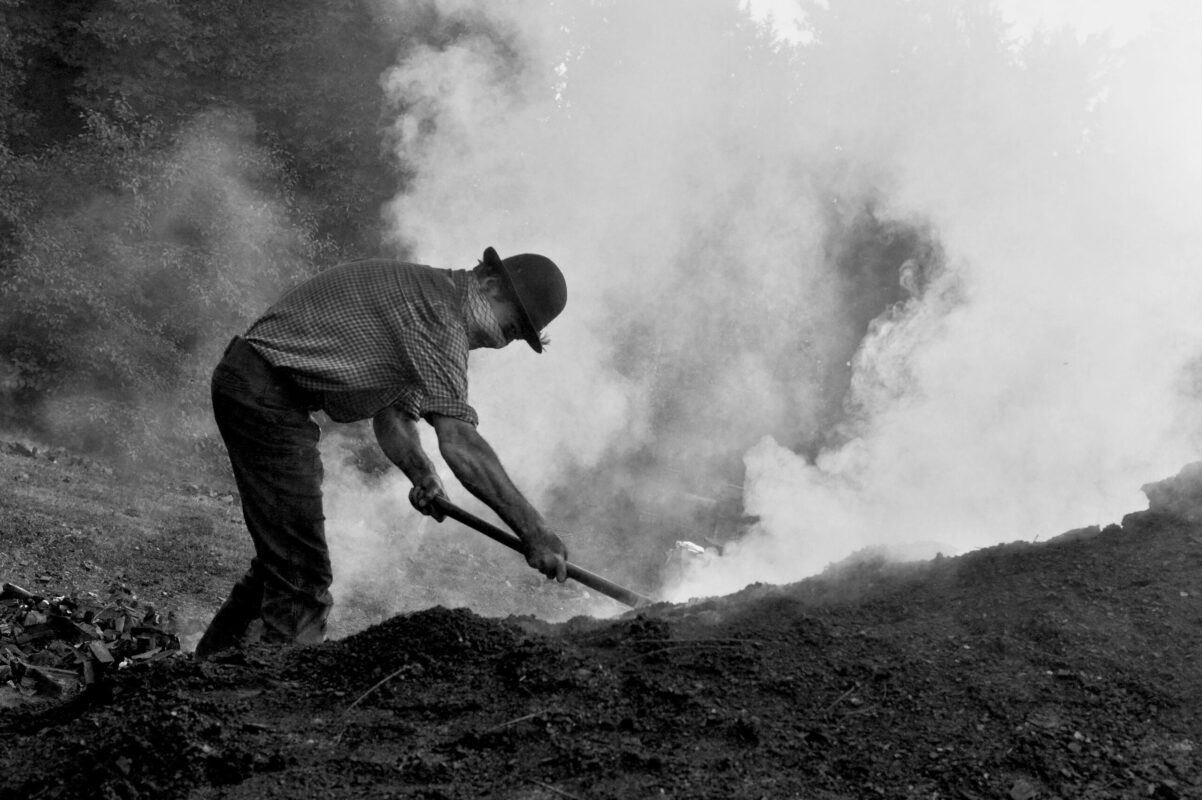Wald Kohle Kultur

“I am convinced that in artisan work something of the producer becomes perceptible. You may say the spirit, the heart, the hands.”
Dear Thomas, please introduce yourself briefly: Who are you and what do you do at Wald Kohle Kultur?
It was probably the snowy, harsh Black Forest winters of the early sixties that turned my nature into a fire person. After a generally rather overrated run through various educational institutions, I graduated as a lumberjack and forest engineer. After that, I straightforwardly pursued the position of managing director in my own business. To say it with the description of one of my sons, on the question in school what his father was: “Schwarzarbeiter” (he meant of course charcoal burner, what did you think).
Can you describe your various activities more precisely?
Only this much, anything else would take too long: my curiosity and life taught me more than the above-mentioned professions, which are, among others, charcoal maker, cultural creator, orchardist, teacher, distiller, storyteller, author, companion and consultant. From this, based on my well-being and especially the weather and the seasons, my daily and weekly planning is woven to the annual schedule.
One of your professions: The profession of charcoal maker. This craft of making charcoal seems to be nearly nonexistent these days. How did you come to this now rare craft?
I continue what one of my ancestors, who had to emigrate to America as an economic refugee in the middle of the 19th century, passed on to me. He was a charcoal burner and had to leave his home, the Black Forest. Because with the appearance of hard coal, charcoal became unnecessary for the process of iron production. I was born on the same farm in the Black Forest as he was, more than a hundred years later. I learned the connection to him only after more than ten years of charcoal burning, it was probably always deep inside me. I guess that’s what you call destiny.
“From the energy source charcoal, with which thousands of years ago, ores were melted for metal production (and in some countries in the world still are), cooks today prepare food, and tomorrow farmers will enrich their fields and feed and keep their animals healthier.”
What is the difference between your charcoal and the industrially produced charcoal you find in the supermarket?
I am convinced that in artisan work something of the producer becomes perceptible. You may say the spirit, the heart, the hands. All our senses are nourished by what we see, hear, smell, taste, feel. This is our soul food. Whether the charcoal I make or the spirits from my distillations, I try to be as close and as deeply as I can in the creating process. To be close to all the elements is what this means for all I do. In the case of my charcoal, this means that from the selection of trees in the forest, which I harvest and prepare, to the finished charcoal in the paper bags, I accompany the creation of the result through my work. On a superficial level of perception, this is noticeable through greater heat development, the length of the glow duration and the purity of the burn of my charcoals.
What does charcoal have to do with climate protection? What role does the topic of holistic sustainability play for you?
Charcoal or plant based charcoal, a very old part of our cultural history, can and will play a significant role in climate protection. As a charcoal maker, I also see myself as a mediator of this ancient connection of us to the fire. Through my work, I can try to create a connection between our past – present – and future. From the energy source charcoal, with which thousands of years ago, ores were melted for metal production (and in some countries in the world still are), cooks today prepare food, and tomorrow farmers will enrich their fields and feed and keep their animals healthier. Other uses of plant based charcoal can be found in filtration technology, construction and much more. Of course, burning charcoal is the worst thing imaginable in terms of climate protection. The experience of an ancient tradition and today’s possibilities with the product charcoal, with new technologies serve me as an apology for my actions. This explains, I think, my attitude to sustainable action! For further information see also https://fachverbandpflanzenkohle.org/

How significant is the demand for artisanal charcoal in the catering industry?
My opportunities to produce a sufficient amount of charcoal in traditional charcoal kilns is increasingly becoming a problem for me due to the high demand from the gastronomy. That’s why I’m experimenting with a Kon Tiki pyrolysis kiln to become less dependent on the complex charcoal production in earthen kilns. We will see, I am very excited.
What role does cooperation with the sector play for you?
To continue feeding my curiosity about life. Meeting and communicating with people who understand and do their work in a similar way and attitude as me.
What are the main points that you think need to be changed in the next few years within the food industry, gastronomy and agriculture and why?
Well, I don’t have a patent on that, of course. Based on my experience, I can say that persistent pursuit of an inner attitude in one’s actions generates a maximum of pleasure, appreciation, own and external, and impact. In other words, to keep on working on good and meaningful ideas.
Photos:
Burkhard Riegels
Find out more about Thomas Faißt:
Website